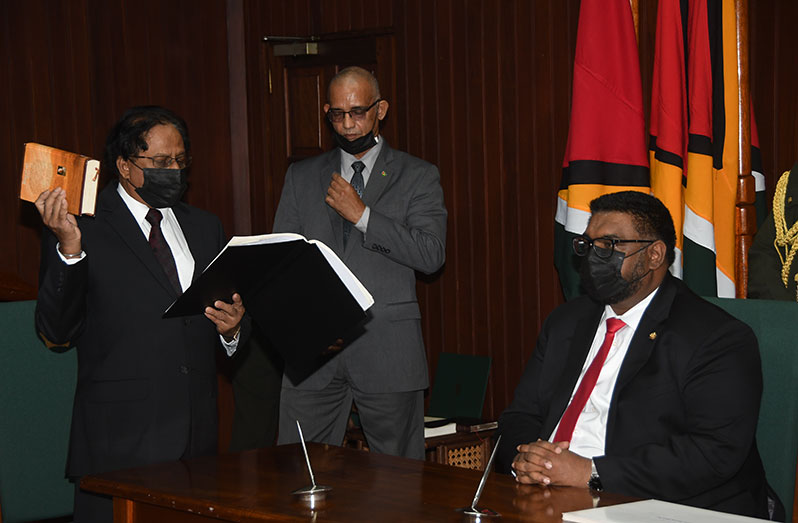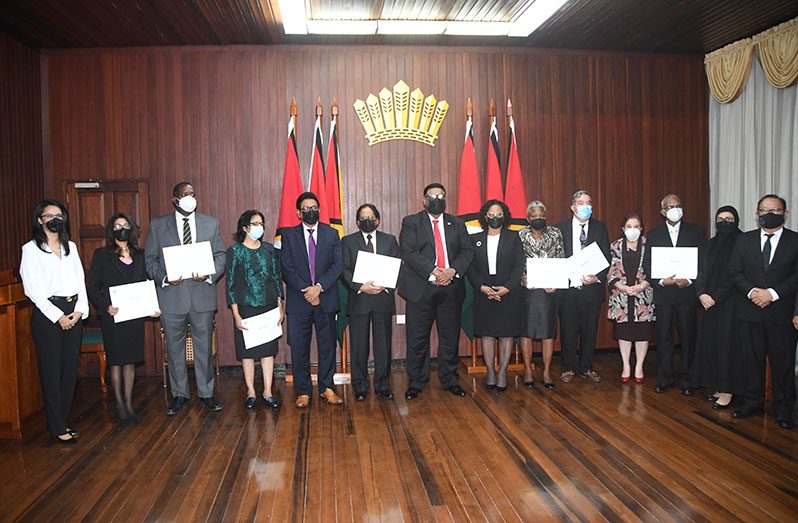–with activation of country’s first-ever Law Reform Commission
GUYANA has moved one step closer to addressing its archaic legal infrastructure, with the swearing-in of persons to the country’s first-ever Law Reform Commission (LRC), on Wednesday.
The activation of this commission through the swearing-in of the commissioners, paves the way for incremental legislative amendments to be made, in alignment with global legislative trends.
A Law Reform Commission is an instrumental body in any society, as it ensures that the legal system does not remain stagnant. It keeps the law under constant revision, and makes recommendations to Parliament for the repeal, creation, consolidation and codification of the laws.
Subject to Section 7 of the Law Reform Act, which enables the appointment of the commission, the duty of the Commission is to keep laws relating to Guyana under review, with a view to its systematic development and reform.
The commission is tasked with overlooking the modification of any branch of the law, the elimination of anomalies, the repeal of obsolete and unnecessary enactments, the reduction of the number of separate enactments and, generally, the simplification and modernisation of the law.
Leading the way in this regard, as the Chairman of the Commission, is Justice of Appeal (Ret’d) Beasraj Singh Roy, who was sworn in by President, Dr. Irfaan Ali, during a simple ceremony at State House.
The other persons who were sworn in as commissioners are Vice-President of the Guyana Bar Association (GBA), Teni Housty; former High Commissioner of Guyana to Canada, Clarissa Riehl; Veteran educator and proprietor of Nations Incorporated, Dr. Brian O’Toole; and attorneys-at-law Emily Dodson, Roopnarine Satram, and Deenawatie Panday.

While delivering brief remarks at the swearing-in ceremony, President Ali related that laws which are enacted at a particular time will only be applicable for a period of time, until society progresses and new laws to reflect societal changes are required.
“Society does not remain static; it is subject to change. The law, as a central pillar of civilised societies, must, therefore, be regularly updated in order to keep abreast with societal changes … to fill gaps to the country’s legislative architecture, harmonise our laws with our international obligations and to be responsive to the demands of modern justice,” the President said.
He added: “Law reform is not new to Guyana; throughout our history, new laws were enacted and old and existing laws were repealed and amended; however, much of Guyana’s laws still remain dated and run the risk, if not updated, of becoming obsolete.”
The President said too that not every piece of legislation drafted in one society could be easily transplanted into another or will be able to produce the desired results in a society it was not drafted to reflect. For this reason, he reasoned that it has to be drafted to suite the peculiar circumstances of society.
He posited that while the commission is vital to ensuring that the government develops a systematic approach to legal reforms and develops a programme for such reforms, it will also facilitate the modernisation of the country’s laws.
“The work of the commission is also critical to ensuring that Guyana keeps abreast with the emerging and evolving legislative trends in the word. The work of the commission will ensure that our country’s legislation does not stagnate or become backward,” President Ali said.
The Law Reform Commission Act 2016 was enacted by the former A Partnership for National Unity + Alliance For Change (APNU+AFC) government, but was significantly flawed in relation to the appointment of Commissioners.
That Act was eventually amended when the Law Reform Commission (Amendment) Act 2021 – No. 2 of 2021 received Presidential Assent on February 16, 2021.
TOP PRIORITY
President Ali told the commissioners that law reform is a “top priority” for his administration. And the government’s commitment to legal reform was highlighted by the swiftness with which the amendments to the Act were made.
“Legal reforms must enhance, not inhibit, human rights and freedoms. Legal reforms must, of necessity, empower citizens and protect them from arbitrariness. It must foster and facilitate not frustrate development. Legal reform has helped to build greater trust between our system, citizens and our justice system. These, I believe, represent the litmus test of the effectiveness of legal reforms,” the Head of State said.
Prior to the amendment of the Act, for one to be appointed a member of the Law Reform Commission, they first needed to be in possession of legal and judicial qualifications; be the holder of, or held judicial office; be an attorney-at-law for at least 10 years or possess experience as a teacher of law at a university.
The amendment of the Act caters for diversity and inclusivity to be reflected as part of the commission, as this will allow for the commission to comprise persons who have a legal background, as well as persons who have at least 10 years of experience in the areas of banking, industry, economics or commerce, social or natural sciences, and law enforcement.
Section 4(1) (b) also requires that the Minister of Legal Affairs consults with the organisations that appear to represent the legal profession, organisations such as the private sector; the trade union movement; the entities representing the interest of consumers’ affairs; the religious community; the rights commissions; and the National Toshaos’ Council for the appointment of members of the commission.
The Attorney-General and Minister of Legal Affairs, Anil Nandlall, S.C., said that the swearing-in of the commission is a “momentous and historic” occasion as it is the first commission of such to be appointed in Guyana, although the Commonwealth Nations have long realised this objective.
While the Commission will play the important role of drafting law which captures the “aspirations, social issues, and important factors that people of society are affected by,” it will also play a pivotal role in the drafting of new laws to meet the exigencies that will arise with the new economic developments of Guyana.
To get the ball rolling, the Attorney-General is desirous of the commission joining his office to undertake a law revision and consolidation project he is currently working on to revise the complete Laws of Guyana and draw together different enactments and amendments on a topic into their respective principal Acts.
Dr. O’Toole told the Guyana Chronicle that his appointment came as a “surprise” since he is not even a lawyer.
He hopes to make meaningful contributions since he worked on projects like the Citizen Security Strengthening Programme (CSSP) which enabled him to interact with thousands of prisoners across Guyana.
Housty, on the other hand, told this publication as the President indicated, law reform is “very much needed” in Guyana and with a law reform commission there is a sound methodology to implement “sustainable and meaningful” change in Guyana.
The establishment of a Law Reform Commission is part of a fundamental component of the US$8 million Inter-American Development Bank (IDB)-funded Support for the Justice System Programme.
The IDB will fund the functioning of the commission for a specified period, after which the government is expected to take over.




.png)









